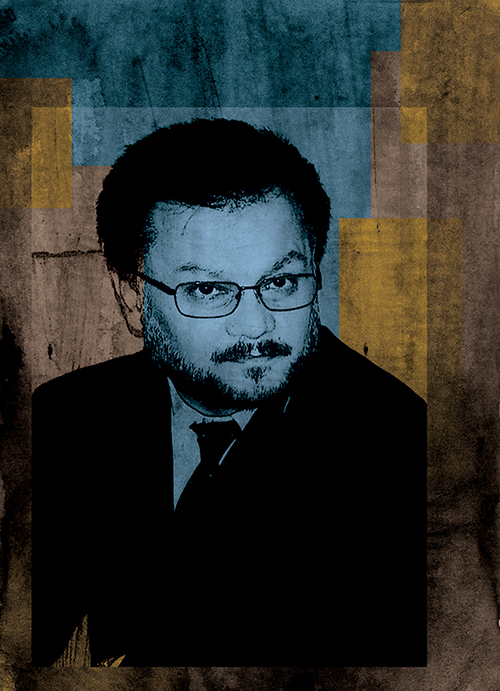Tourialay Ghiassi has been a civil society activist, writer, and a political analyst for many years. He studied engineering in the Polytechnic of Kabul. He is the founder and licence holder of Mihan [Homeland] magazine and Eslahat [Reforms].
Can you share with us some memories of instances when your rights have been violated and how they have influenced your life?
I was held as a political prisoner in 1982 and denied the right to appoint a defence lawyer. All political prisoners were denied this right at the time. The prison authorities even decided the times when we were allowed to go to the toilet. If anybody needed to go at other times, they had to wait or relieve themselves in the cell, where we were detained like sheep. This is how the Communist government violated our most basic human rights.
In 1984, I was a student at the Kabul Polytechnic. I had successfully finished my first year when we were informed about scholarships in East Germany and Russia for the new students. I passed the entrance exam and satisfied all of the academic requirements. However, I was ultimately rejected and told: “You are not a useful person for the society. These scholarships are intended for the honest and revolutionary children of the society. You can contact the officials to resolve your problem.” As soon as I heard the name of the official concerned, I decided to forget about the scholarship.
What are the most important achievements since the time of the Taliban in Afghanistan?
Freedom of expression, free and diverse print and audiovisual media, freedom of action by civil society institutions, the approval of the constitution, the establishment of the legislature, building a culture of elections and starting to enjoy the benefits of democracy.
Otherwise, I could also talk about the construction of a fibre optic network that allows us to connect with our neighbouring countries, the familiarization with and extensive usage of telecommunication technology, such as the Internet and mobile phones, the development of the education system, the establishment of production plants, the growth of exports, mining, exploration of oil and gas, and the construction of freeways and access roads between the various provinces.
What gives you hope for the future?
There are many things. In particular, I am hopeful because of the way our society has collectively approached and embraced democracy and civil society, including the separation of powers and the freedom of expression, exercised by a powerful press and media as the fourth pillar. All of these matters are based on and protected by our new constitution.
What do you fear most today?
I am most afraid of a return to the past, to the third-wave of democracy and the way that it gave way to dictatorships. As Samuel Huntington once said, just because a country has transitioned to democracy, continued democratisation is not guaranteed… Some countries have not yet consolidated their system of democracy, even though the authoritarian regime has collapsed and an alternative regime has emerged. In Afghanistan, the fear that transitional democracy might fall to dictatorship prevails.
What are the biggest challenges facing Afghanistan?
There are a number of risks to our society. Most of the risks can be located in cultural despotism or the presence of a monolithic culture. This risks giving rise to renewed civil war and social revolution, and at worst, the disintegration of Afghanistan.
Is it possible that girls could once again be banned from schools and women excluded from social participation, as was the case under the Taliban?
If Afghanistan ever experiences the rule of the Taliban again – that is, if we fail in the democratic project and fall back into dictatorship – the schools will be closed to girls regardless of the society’s opposition.
Which factors deter women’s participation in social, economic, political and cultural spheres?
There is a pervasive societal ethic, culture, and attitude that rejects the presence of women who work and are active in civil society. Certain aspects of the family structure raise the obstacles for women to access higher education, for instance early marriages and childbirth and the familial responsibilities that result. On a higher level of analysis, we lack a governmental strategy as to how culture, education, and society can be adapted to transform the problems we currently face.
What are the major demands of women?
The elimination of all kinds of sexual violence and discrimination, access to justice and equal rights with men, and to have an effective and active representation and decision-making presence in the political, economic, and cultural arenas.
What have you done in your personal and professional life to fight against discrimination?
In my private life, I have ensured that my daughters and sons have access to equal educational opportunities. In the public domain, I have appointed women to various posts or referred them to the Ministry of Foreign Affairs for employment.
“Unveiling Afghanistan, the Unheard Voices of Progress” is a campaign by Armanshahr and FIDH, which explores views held by Afghan civil society actors. Over 50 days, 50 influential social, political, and cultural actors hope to spark conversation and debate about building a society that is inclusive of women’s and human rights in Afghanistan.
Follow 50 interviews drawn from the “Unveiling Afghanistan campaign” daily on the Huffington Post. Follow Unveiling Afghanistan on FIDH Twitter: www.twitter.com/fidh_en


